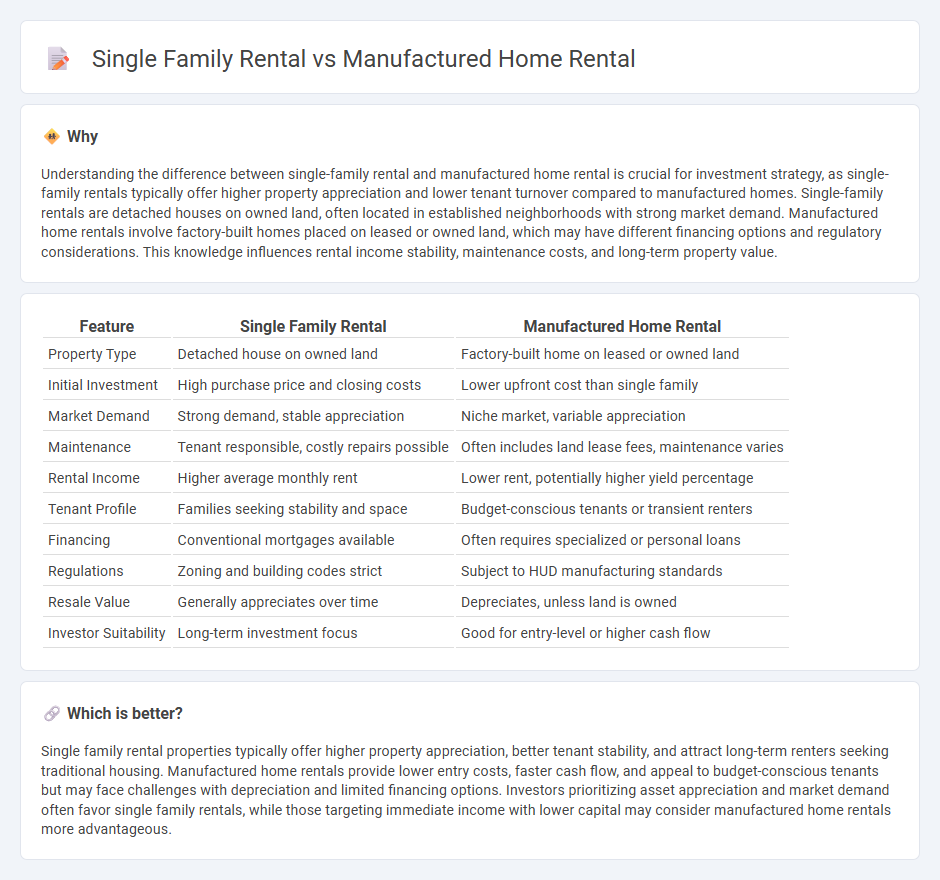
Single family rentals typically offer more space, privacy, and appreciation potential compared to manufactured home rentals, which are often more affordable and provide quicker cash flow. Investors looking for long-term equity growth tend to favor single family homes, while those seeking lower entry costs and higher yield may prefer manufactured homes. Explore the key differences and benefits to determine which investment aligns with your real estate goals.
Why it is important
Understanding the difference between single-family rental and manufactured home rental is crucial for investment strategy, as single-family rentals typically offer higher property appreciation and lower tenant turnover compared to manufactured homes. Single-family rentals are detached houses on owned land, often located in established neighborhoods with strong market demand. Manufactured home rentals involve factory-built homes placed on leased or owned land, which may have different financing options and regulatory considerations. This knowledge influences rental income stability, maintenance costs, and long-term property value.
Comparison Table
| Feature | Single Family Rental | Manufactured Home Rental |
|---|---|---|
| Property Type | Detached house on owned land | Factory-built home on leased or owned land |
| Initial Investment | High purchase price and closing costs | Lower upfront cost than single family |
| Market Demand | Strong demand, stable appreciation | Niche market, variable appreciation |
| Maintenance | Tenant responsible, costly repairs possible | Often includes land lease fees, maintenance varies |
| Rental Income | Higher average monthly rent | Lower rent, potentially higher yield percentage |
| Tenant Profile | Families seeking stability and space | Budget-conscious tenants or transient renters |
| Financing | Conventional mortgages available | Often requires specialized or personal loans |
| Regulations | Zoning and building codes strict | Subject to HUD manufacturing standards |
| Resale Value | Generally appreciates over time | Depreciates, unless land is owned |
| Investor Suitability | Long-term investment focus | Good for entry-level or higher cash flow |
Which is better?
Single family rental properties typically offer higher property appreciation, better tenant stability, and attract long-term renters seeking traditional housing. Manufactured home rentals provide lower entry costs, faster cash flow, and appeal to budget-conscious tenants but may face challenges with depreciation and limited financing options. Investors prioritizing asset appreciation and market demand often favor single family rentals, while those targeting immediate income with lower capital may consider manufactured home rentals more advantageous.
Connection
Single-family rental homes and manufactured home rentals are both key segments in the residential real estate market, offering affordable housing options with distinct ownership structures. Manufactured homes, often located in communities or on leased land, provide cost-effective alternatives to traditional single-family rentals, appealing to budget-conscious tenants. Investors leverage the steady demand and lower maintenance costs of both types to diversify rental portfolios while addressing housing shortages.
Key Terms
Depreciation
Manufactured home rentals typically experience faster depreciation compared to single-family rentals due to lower construction quality and shorter lifespan, leading to a higher reduction in value over time. In contrast, single-family homes often retain value better and may even appreciate depending on location and condition, providing a more stable investment. Explore the detailed differences in depreciation rates and investment returns to make an informed decision.
Tenant Demographics
Manufactured home rentals attract a diverse tenant base, often including lower-income families, retirees, and transient workers seeking affordable and flexible housing options, while single-family rentals typically appeal to middle to upper-middle-class families prioritizing stability, space, and neighborhood amenities. Tenant demographics in manufactured home communities tend to skew younger and more economically varied, with a higher percentage of renters in rural or suburban areas, compared to the more homogeneous, family-oriented demographic found in single-family rental markets. Explore how these demographic insights can influence rental strategies and investment decisions.
Zoning Regulations
Manufactured homes often face stricter zoning regulations compared to single-family rentals, with many municipalities designating specific zones where these homes can be placed, primarily in manufactured home parks rather than traditional residential neighborhoods. Single-family rentals typically benefit from broader residential zoning allowances, enabling more flexible placement and ease of property management. Discover how these zoning distinctions impact investment strategies and community integration by exploring detailed zoning law insights.
Source and External Links
Greenleaf MHP Management LLC | Properties - Offers manufactured home rentals, lot rentals, and rent-to-own programs starting from $550 at locations like Highland Mobile Home Park.
Manufactured Homes for Rent - Sun Communities - Provides high-quality manufactured homes for rent across the U.S. with modern designs, up to 1,650 sq ft, featuring amenities like kitchen appliances and community facilities.
Gainesville, GA Mobile Homes For Sale or Rent - MHVillage - Listings of about 19 manufactured homes for rent or sale near Gainesville, GA, including rent-to-own options ranging around $1,499 to $1,899 with details on home size and condition.
 dowidth.com
dowidth.com